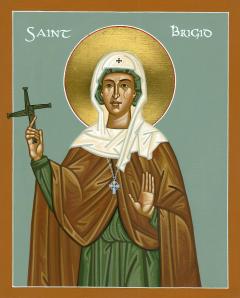I’ll be the first to admit that consistent prayer is not my strong suit. I need lots of help remembering to “pray without ceasings,” as I Thessalonians 5:17 commands. In my journey to be more faithful, one thing has tremendously improved my prayer life. A few years ago, I LITERALLY made room for prayer in our home. That is to say, I set aside dedicated space for times of prayer and worship. There are various names for this kind of space depending on your tradition: home altar, family altar, prayer/icon/beautiful corner, or simply a family prayer space. Whatever you call it, the concept and purpose is the same. This special area is devoted specifically to prayer.
I thought I’d share with you a few tips that I learned from creating my own prayer space.
1. CHOOSE A CENTRAL LOCATION
Of course, there are certain times when prayer needs to happen in a private and secluded place. A little tip I learned from my mother-in-law: bedroom closets are perfect for private prayer. A home altar, on the other hand, is a space for cooperate prayer (at least, this is the way we use it in our family). For this reason, we chose a central location. Affording our altar a place of honor in the center of our home ensures that it will be a visual reminder to us throughout the day…a continual invitation to stop what we are doing and make time for prayer. In our current home, the altar stands on a tall dresser in our living room. It is one of the first things people see when entering our front door. In this way, our altar also becomes a form of witness. Those who visit our house know immediately that we are Christians.
2. MAKE IT BEAUTIFUL
Prayer is beautiful. We get to talk to the One who created the heavens and the earth…to communicated with the God who expertly crafted a breathtaking and magnificent universe. By making our prayer space beautiful, we are reminded of God’s artistry and encouraged to have an attitude of awe and reverence. Therefore, we keep several symbolic items on our altar that are especially lovely. These are NOT “magical” objects to increase the power of our prayers…they are simply tools that focus our hearts and to teach us about what we are doing when we pray. Here are some of the items we use:
- An oil lamp (also called a “vigil” lamp) – Scripture is filled with images of light and lamps. In the New Testament, Jesus tells His followers,
“You are the light of the world…let your light shine before others, so that they may see your good works and give glory to your Father who is in heaven.” (Matthew 5:14-16).
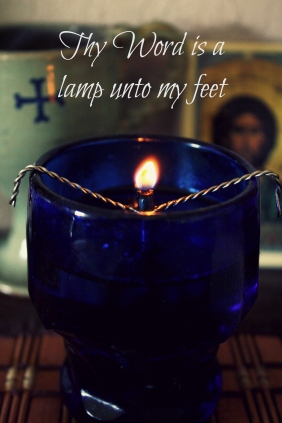 For some, a regular candle may be preferred. An oil lamp, however, is unique because it requires attentive care throughout the day. The oil must be replenished and the wick kept trimmed. While a candle may be burned for short periods, many use vigil lamps all day long. This is the perfect analogy for our Christian life in anticipation of Christ’s second coming. In Luke 12:35, Jesus reminds us, “Stay dressed for action and keep your lamps burning.”***
For some, a regular candle may be preferred. An oil lamp, however, is unique because it requires attentive care throughout the day. The oil must be replenished and the wick kept trimmed. While a candle may be burned for short periods, many use vigil lamps all day long. This is the perfect analogy for our Christian life in anticipation of Christ’s second coming. In Luke 12:35, Jesus reminds us, “Stay dressed for action and keep your lamps burning.”***
- A prayer book and Bible – As an Anglican family, the Book of Common Prayer is central during our prayer times. Whatever devotional books that you find helpful should find their way to your home altar. Of course, we also keep our family Bible (which happens to be a Children’s Bible right now) on the altar for reading together.
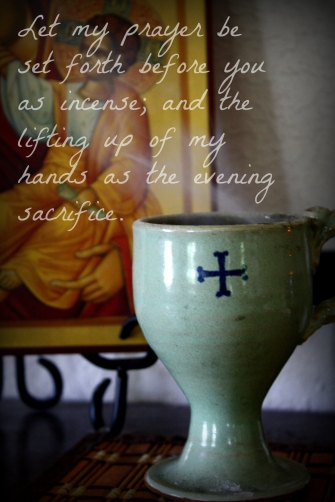 A hand censer – What a beautiful and mystifying symbol! Observing the fragrant smoke dance and rise from our censer, we think about our prayers rising up to God. As the incense fills our living room, we consider how God’s Spirit fills and surrounds us all the time. For my fellow Protestants who hesitate to incorporate incense into their prayer lives, consider how big a role incense plays in Biblical worship. Throughout the Old Testament, we see God’s people burn incense during times of worship and prayer. In Exodus 30, God gives very specific instructions about burning incense in the Tabernacle, and Malachi 1:11 declares,
A hand censer – What a beautiful and mystifying symbol! Observing the fragrant smoke dance and rise from our censer, we think about our prayers rising up to God. As the incense fills our living room, we consider how God’s Spirit fills and surrounds us all the time. For my fellow Protestants who hesitate to incorporate incense into their prayer lives, consider how big a role incense plays in Biblical worship. Throughout the Old Testament, we see God’s people burn incense during times of worship and prayer. In Exodus 30, God gives very specific instructions about burning incense in the Tabernacle, and Malachi 1:11 declares,
For from the rising of the sun to its setting my name will be great among the nations, and in every place incense will be offered to my name, and a pure offering. For my name will be great among the nations, says the LORD of hosts.
Again, in the book of Revelation, we read about the presence of incense in heavenly worship:
And another angel came and stood at the altar, holding a golden censer; and much incense was given to him, that he might add it to the prayers of all the saints upon the golden altar which was before the throne. And the smoke of the incense, with the prayers of the saints, went up before God out of the angel’s hand. Rev. 8:1-4
I highly recommend checking out Orthodox Incense for vigil lamps, incense, and censers. They have gorgeous handmade items and two great starter sets (a vigil lamp starter set and an incense starter set). I buy all of our oil, wicks, charcoal, and incense from them and have been so pleased time and time again. My current favorite incense to burn is called “Old Church” – a complex and woody blend of labdanum, frankincense, cedar & fir needle and vetiver, with a touch of spices.
- Devotional images – As Anglican Christians, our family values the use of Icons in worship. Since this is an area of debate among Christians, I won’t go into detail about iconography here. Any image that helps draw us closer to God and focus our hearts may be used: a framed picture of nature, a meaningful quote, a favorite verse of Scripture, or even a picture of your family. We do not worship or pray TO these images. Rather, we use them to bring us into an attitude of prayer.
 A cross and/or other handheld items – Prayer is not just an act of the mind. God made humans tactile. For this reason, we have several small items (a few different crosses, a prayer cube, and prayer beads) that can be held or used while we pray. This is especially helpful for my wiggly and energetic children. When they are allowed to hold a necklace with beads, a cross, or a prayer cube…it keeps their hands and their hearts engaged.
A cross and/or other handheld items – Prayer is not just an act of the mind. God made humans tactile. For this reason, we have several small items (a few different crosses, a prayer cube, and prayer beads) that can be held or used while we pray. This is especially helpful for my wiggly and energetic children. When they are allowed to hold a necklace with beads, a cross, or a prayer cube…it keeps their hands and their hearts engaged.
3. USE IT!
Our prayer times as a family aren’t especially complicated. Once a week, we try to have a family prayer service before bed. We typically use a shortened version of Evening Prayer (from the Book of Common Prayer). In the mornings, on the other hand, my prayer with the kids (age 3 and 1) is much shorter. We light the oil lamp and incense, sing a simple song like “Jesus Loves Me,” offer some extemporaneous prayer, and usually close with the Lord’s Prayer. Often we will follow our prayer time with a reading from an illustrated children’s Bible. As they get older, our morning prayer will grow in complexity: readings from the Psalms, daily collects (written prayers), and confessional prayer. The kids and I don’t do this every day, although I’d like to move toward that goal. We also use our home altar for special occassions, like when we celebrate the anniversary of our children’s baptisms.
Don’t be discouraged if it takes some time to become regular in the habit of family prayer. I’ve learned that my efforts may not be consistent or perfect, but we are definitely moving in the right direction. God will honor those efforts and help to multiply them.
Does your family pray together on a regular basis? What kind of space to you use during this time?
***Please remember that burning incense and lighting vigil lamps (or candles) should be done with caution. Make sure that you place your censer and/or vigil lamp on a sturdy base, to avoid spilling of hot coal or oil. Watch for children and animals when using hot objects. You should never leave the censer or oil lamp unattended.
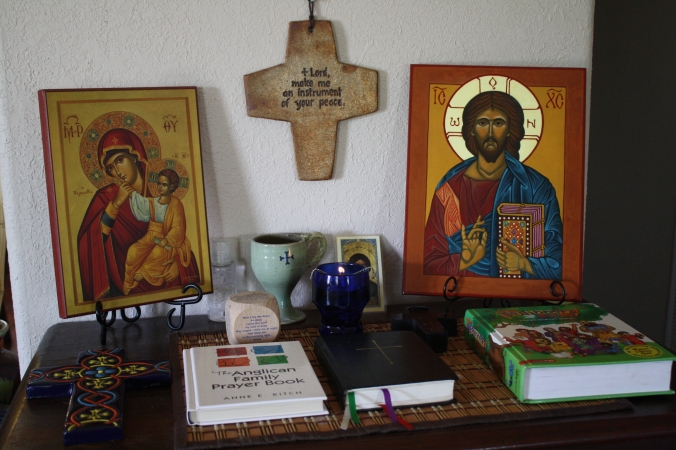

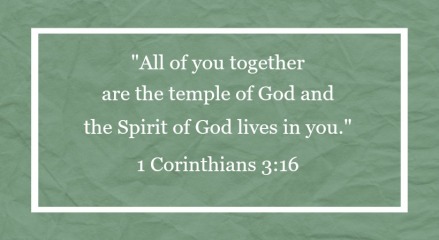
 Lent is coming. It’s the season when we journey together toward Golgotha, toward death, and ultimately toward rebirth. My commitment is to pay attention to the kicks and wiggles during this Lenten season. I want to feel the swell of the Church’s belly and the movement of the Spirit within her. I ask that God would give me an attitude of expectation and restlessness, granting me eyes to see and ears to hear what the Spirit wants to do and say.
Lent is coming. It’s the season when we journey together toward Golgotha, toward death, and ultimately toward rebirth. My commitment is to pay attention to the kicks and wiggles during this Lenten season. I want to feel the swell of the Church’s belly and the movement of the Spirit within her. I ask that God would give me an attitude of expectation and restlessness, granting me eyes to see and ears to hear what the Spirit wants to do and say.

.jpg&container=blogger&gadget=a&rewriteMime=image%2F*)






 I’ve been seeing a lot about “The Elf on the Shelf” tradition lately, and I just can’t stop from commenting. FYI: I’m a Grinch when it comes to many commonly excepted holiday traditions because of what they communicate and how much they distract – so be forewarned. For the sake of brevity…I’m gonna stick to the Elf for this post. According to Wikipedia,
I’ve been seeing a lot about “The Elf on the Shelf” tradition lately, and I just can’t stop from commenting. FYI: I’m a Grinch when it comes to many commonly excepted holiday traditions because of what they communicate and how much they distract – so be forewarned. For the sake of brevity…I’m gonna stick to the Elf for this post. According to Wikipedia,


 ADVENT WREATH: The Advent wreath is probably the most recognized Advent custom. It is a wreath made of evergreens that is bound to a circle of wire. It symbolizes the many years from Adam to Christ in which the world awaited its Redeemer; it also represents the years that we have awaited His second and final coming. The wreath holds four equally spaced candles, the three purple ones lit on the “penitential” Sundays and a pink one for Gaudete, the joyful third Sunday in Advent. Its a wonderful tradition to use the wreath as a part of your family devotions, as well.
ADVENT WREATH: The Advent wreath is probably the most recognized Advent custom. It is a wreath made of evergreens that is bound to a circle of wire. It symbolizes the many years from Adam to Christ in which the world awaited its Redeemer; it also represents the years that we have awaited His second and final coming. The wreath holds four equally spaced candles, the three purple ones lit on the “penitential” Sundays and a pink one for Gaudete, the joyful third Sunday in Advent. Its a wonderful tradition to use the wreath as a part of your family devotions, as well.

